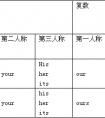下列各句均有一处错误, 请找出并改正。1. My family is all at home. ________ _2. What do your father do?________ _3. The girl wants be a doctor._____ _ 4. Hi-九年级英语
考点名称:并列连词
- 并列连词:
主要是用来表示并列关系、选择关系、因果推理关系等。也可用来连接平行的词,词组或分句。 并列连词表示关系及代表实例:
1.表示并列关系
表示并列关系的连词主要含有“和”、“补充”、“增加”等意思。用来表达并列关系的连词有如下几个:
and 和 both...and...二者都
either...or...或者...或者...
neither...nor...既不...也不...
as well as 也、连同
not only...but (also)... 不但...而且...
e.g.
I used to live in Paris and London.
我过去住在伦敦和巴黎。
Both Jane and Jim are interested in pop music.
詹妮和吉姆对流行音乐都很感兴趣。
She is not only kind but also honest.
她不但和蔼而且诚实。
Bob as well as his parents is going on holiday this summer.
鲍勃和他的父母今年夏天要去度假。
2.表示转折关系
常用来表示转折关系的并列连词有如下几个:
but 但是
yet 然而
still 仍然
while 然而
while 然而、偏偏
e.g.
The winter in Beijing is very cold while that of Kunming is warm.
北京的冬天很冷,然而昆明的冬天却很温暖。
I explained twice, still he counldn't understand.
我解释了两遍,然而他却还不懂。
3.表示选择关系
表示选择关系的并列连词:
or 或者
or else 否则
otherwise 否则
neither...nor... 既不...也不...
either...or... 或者...或者...
e.g.
Would you like leave or would you like to stay?
你是想走还是想留?
You can come either on Saturday or on Sunday.
你可以星期六来也可以星期天来。
Neither you nor I nor anyone else believes such things.
不管你我或者其他任何人都不会相信这件事。
4.表示因果推理关系
表示因果关系的并列连词主要有so,for,then,therefore 等。
e.g.
The air here is polluted, so the crops are dying.
这里的空气受到了污染,所以庄稼快死了。
The leaves of the trees are falling, for it's already autumn.
树叶在落下,因为秋天已经到来了。- 并列连词注意事项:
并列连词for引导的分句只能放在句尾,前面用逗号隔开,表示补充说明的微弱理由,只是为前面的内容提供判断的理由,有时译为并列的某种形式。
这与because不同,because引导的是一种明确的因果关系,解释原因,常可回答why的提问。 - 几个特殊并列连词用法:
一、表示并列关系的and,or,well,as,not only...but also... 等连词也有比较活跃的用法。
and 作为并列连词有多重含义,除了可以表示并列关系外,还可以表示顺承、目的、条件、反复等关系。
e.g:He went to market and bought some vegetables.(表示顺承,动作的先后发生)
他到市场买了一些蔬菜。
Come and help me out.(表示目的)
过来帮我一下。
Be careful and you'll make fewer mistakes.(表示条件)
如果仔细,你所犯的错就少。
二、or 与 either...or...
or表示为“否则”的话,前句一般是祈使句,后句用一般将来时。
在表示选择关系时or 与 either...or... 用法相同,但 either...or...更具强调性。
在多个对象进行选择时,可以用A or B or C... , either A or B or C... , neither A or B or C... 。
e.g:Either Jim or Jake or Jeff knows about this.
三、as well as 与not only... but also...
名词+as well as+名词作主语时,强调前面的名词,谓语动词要根据前面的名词而定。
not only...but also...连接名词作主语时,其强调在后者,谓语动词要根据后面的名词而定。
e.g:China as well as many other countries loves peace.
中国与世界上的其他许多国家一样热爱和平。
Not only Bill but also his parents want to go traveling by bike.
不仅比尔而且他的父母都想骑自行车去旅游。
注:当or,neither...nor...,either...or 等连接主语时,谓语动词由or或nor后面的部分而定。 - 并列连词表示关系:
种类
用法
举例
并列连词
表示转折关系
but, yet等
表示因果关系
For, so等
表示并列关系
And, or, either…or,
neither…nor, not only..
but also, as well as等
考点名称:主谓一致
- 英语中的一致主要包括主语和谓语在人称和数上的一致、时态一致、名词和其代词的一致。
主语和谓语保持一致叫主谓一致,即谓语动词的形式必须随着主语单、复数形式的变化而变化。 - 主谓一致原则:
1、语法上的一致
所谓语法一致原则,即主语和谓语的语法形式在人称和数上取得一致。
谓语的单、复数形式依据主语的单、复数形式而定:主语为复数,谓语动词用复数;主语为单数或者是不可数名词,谓语动词用单数。
China belongs to the Third World. 中国属于第三世界。
We are sure he will come. 我们肯定他会来。
使用语法一致的情况
(1)当主语是and,both…and连接的并列结构
如果主语指的是两个或两个以上的人或物,则谓语动词用复数。
My mother and I have seen the film. 我妈妈和我已看过这部电影。
Both rice and wheat are grown in this part of China. 在中国的这个地方既种稻子又种小麦。
注意:由and连接的并列主语前面分别有each,every,no修饰时,其谓语动词用单数形式。
Every boy and every girl has to receive education in our country. 在我国每一个男女孩子都得受教育。
No student and no teacher was invited to the party. 师生没有被邀请参加晚会。
(2)主语后面接说明主语的修饰语
主语后面接说明主语的修饰语如:
with,along with,together with,as well as,like,rather than,but,except,besides,including,in addition to,
谓语动词不受修饰成分的影响,仍保持同主语一致的关系。
The teacher with two students was at the meeting. 那位老师和两个学生参加了会议。
The girl as well as the boys has learned to drive a car. 这个姑娘和男孩子一道,也学会了开汽车。
A library with five thousand books is offered to the nation as a gift.一个有5000册书的图书馆作为礼物赠送给了国家。
E-mail, as well as telephones, is playing an important part in daily communication.电邮和电话在日常的通信中起着很重要的作用。
Nobody but Jane knows the secret.只有简知道这个秘密。
All but one were here just now. 刚才除了一个人外都来了。
(3)非谓语动词或从句作主语
非谓语动词 (动词的-ing形式、不定式)或从句作主语时,谓语一般用单数形式。
When and where to build the new factory is not decided yet.什么时候在什么地方建新工厂还没定下来。
Checking information is very important. 核实事实是非常重要的。
To learn foreign languages is not easy. 学习外语并非易事。
When we will hold the meeting is not decided yet. 我们何时开会尚未决定。
注意:当what引导主语从句或由 and连接两个动词不定式或动名词作主语时,谓语动词的数应根据意义一致的原则来决定。
What we need here is money.我们这里需要的是资金。
What we need here are workers.我们这里需要的是工人。
Lying and stealing are immoral.说谎与偷窃是不道德的。
(4)each和复合不定代词作主语
each和some/any/no//every十body/one/thing构成的复合不定代词:
anyone、anybody、anything、everyone、everybody、everything、someone、somebody、something、no one、nobody、nothing、each、the other作主语,谓语动词用单数。
Each is worse than the one before. 一个比一个差。
Nobody knows the answer. 没有一个人知道这答案。
Someone wants to see you. 有人想见你。
Is there anything in the box?箱子里有什么东西吗?
There is a lot of milk in the bottle. 瓶子里有很多奶。
(5)“many a +单数名词”作主语
“many a、(很多)/more than one(不只一个)+单数名词”作主语时,谓语动词用单数形式。
Many a student has been to Beijing. 很多学生去过北京。
There is more than one answer to your question. 你的问题不只有一个答案。
(6)“one of+复数名词十定语从句”之前有the等限定词和修饰语
- 最新内容
- 相关内容
- 网友推荐
- 图文推荐
| [家长教育] 孩子为什么会和父母感情疏离? (2019-07-14) |
| [教师分享] 给远方姐姐的一封信 (2018-11-07) |
| [教师分享] 伸缩门 (2018-11-07) |
| [教师分享] 回家乡 (2018-11-07) |
| [教师分享] 是风味也是人间 (2018-11-07) |
| [教师分享] 一句格言的启示 (2018-11-07) |
| [教师分享] 无规矩不成方圆 (2018-11-07) |
| [教师分享] 第十届全国教育名家论坛有感(二) (2018-11-07) |
| [教师分享] 贪玩的小狗 (2018-11-07) |
| [教师分享] 未命名文章 (2018-11-07) |

![The jeans_____ fit for me, maybe, the pair of jeans _____fitter for me.[ ]A.are; are B.is; is C.is ;areD.are; is-八年级英语](http://www.00-edu.com/d/file/ks/4/2/xidongci/2020-01-05/small4952a8c67458a8ae95f5f8e3ea8b4bf91578154110.png)
![Here _____some flowers.[ ]A.isB.areC.amD./-七年级英语](http://www.00-edu.com/d/file/ks/4/2/xidongci/2020-01-04/smallef3acfcb329d087ede3710c354ecc9151578152853.png)
![The price of the socks_____ 10 yuan. [ ]A. are B. is C. does D. can -七年级英语](http://www.00-edu.com/d/file/ks/4/2/xidongci/2020-01-04/small6e5d2db89e73d5a89d7deae9143a225a1578153319.png)


